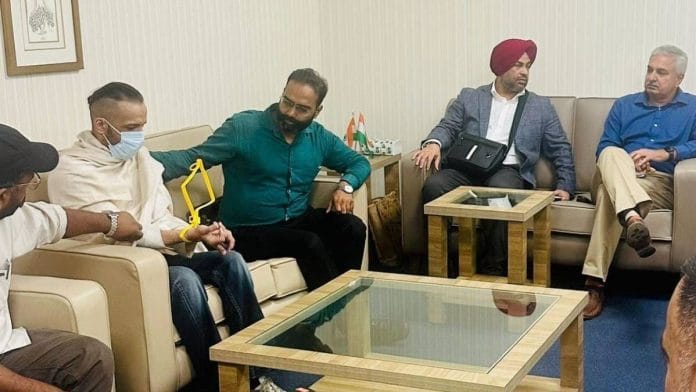New Delhi: In 2016, a group of gangsters, armed with sophisticated weapons, broke into Nabha jail in Punjab’s Patiala district and successfully executed a daring plan to free six dreaded criminals, including two terrorists.
In the following years, police caught most of the suspects and the criminals who had escaped—Harminder Singh Mintoo and Kashmir Singh Galwaddi of the Khalistan Liberation Force (KLF), along with four gangsters named Vicky Gounder, Gurpreet Singh Sekhon, Neeta Deol and Amandeep Dhotian.
However, the probe pointed to a sixth suspect behind the scenes. Police identified him as one Ramanjit Singh, alias Romi, who allegedly plotted the jailbreak from Hong Kong.
Punjab Police Thursday brought Romi, 36, back after securing his extradition with help from the Ministry of External Affairs (MEA), the Ministry of Home Affairs (MHA), the Central Bureau of Investigation (CBI) and Hong Kong’s Department of Justice.

This was only the second extradition from Hong Kong after the 2004 extradition of Ashok Tahilram Sadarangani, accused in a bank fraud case. The CBI brought him back in June 2004, three years after he had fled the country in February. He had allegedly defrauded the Bank of Maharashtra and the Union Bank of India to the tune of Rs 8.5 crore.
ThePrint pieces together how Romi’s extradition was secured.
A daring jailbreak
On the morning of 27 November 2016, four people, dressed in police uniforms, arrived at the Nabha jail in Punjab, pretending to hand over one of their aides to the prison authorities. They then opened fire and took prison guards hostage as they broke into jail. According to officials, they used a self-loading rifle, a Springfield gun, a pistol, and other weapons to fire over 200 rounds to create panic before freeing Mintoo and five others.
“Confessions made by every accused in the Nabha jailbreak ended with Romi’s name, who was said to be operating the gang that attacked the prison security from Hong Kong,” said a Punjab Police officer.
But at the time police had no information of any criminal by that name who had the resources to carry out such an audacious crime, investigators said.
Commenting on the extradition, Punjab Director General of Police (DGP) Gaurav Yadav Thursday said that Romi was the “mastermind” of the Nabha jailbreak. He added that Romi had been in touch with Pakistan’s Inter-Services Intelligence (ISI) and the terrorists Harminder Singh Mintoo and Kashmir Singh Galwaddi.
“Our relentless pursuit of justice led to the issuance of a Look Out Circular (LOC) and Red Corner Notice (RCN) against Romi. The extradition process was set in motion in 2018 under the mutual legal assistance treaty (MLAT) with the Government of Special Administrative Region (SAR) Hong Kong, where the case was robustly presented to the Department of Justice and the Hon’ble Courts of Hong Kong,” DGP Yadav said.
ThePrint has seen a copy of the extradition order signed by the Chief Executive of the Hong Kong SAR on 6 August that lists nine offences under which Romi has been extradited to India, including “facilitating or permitting the escape of a person from custody”.
‘Money launderer, bail jumper’
Punjab Police officers privy to details of the case and Romi’s background said his parents were permanent residents of Hong Kong, where Romi was born and brought up. However, he travelled in and out because of his work, exchanging illegal money from and to India.
His first brush with the law was in 2016 when Patiala Police arrested him in connection with an arms recovery case and recovered from him several credit cards.
“The credit cards he had with him in 2016 were through data skimmed off China and other countries and some Chinese handler had handed over them to him. At that time, there were not too many machines allowing withdrawal of cash from ATM cards and although he tried to use POS terminals for the purpose, there was little information missing and hence he could not be successful,” a Punjab Police officer said.
Investigators further said that it was a chance arrest by the district police and they had no idea what he was capable of at the time. After he was arrested in June 2016, he was lodged in Nabha jail and it was during this two-month-long stay that he developed connections with the gangsters he eventually helped escape in November of the same year.
“He developed good connections with them, especially Gurpreet Singh Sekhon, who was a close associate of his first cousin, and gangster Ramanjit alias Rami Mashana. Through him, he also developed contacts with Vicky Gounder, Gurpreet Singh Sekhon, Neeta Deol and Amandeep Dhotian, who escaped the prison later in November,” the officer said.
Romi violated the bail granted to him in August and fled to Hong Kong where he started planning the jailbreak.
“Every call between gangsters who supplied ammunition and funds to the attackers at Nabha prison was routed by him from Hong Kong. He provided funds and facilitated the safe houses for the attackers in the Nabha jailbreak case. When Palwinder Singh alias Pinda was interrogated, Romi’s name popped up for the first time in this case,” another investigator said.
Uttar Pradesh Police caught Pinda just days after the jailbreak. He allegedly led the attack against security personnel.
Assistant Inspector General (AIG) in Punjab Police’s Anti-Gangster Task Force Gurmeet Singh Chauhan told ThePrint that Romi belonged to Punjab’s Bathinda and jumped bail to escape to Hong Kong.
Appealing ‘short-term’ favourable verdict
Nearly all gangsters and terrorists involved in the jailbreak were later caught — one gangster was killed in an encounter while another is absconding. In that light, Romi’s arrest is being viewed as a victory by police officers. They conceded it was tough to bring him to justice in this case.
“All the foot soldiers of the jailbreak conspiracy were soon re-arrested but the mastermind behind the conspiracy was still at large. We wanted to pursue legal options to get him back in India,” an officer privy to the investigation said.
AIG Chauhan, who was overseeing the investigation, said that a list of documents was prepared by his counterpart Harvinder Singh Virk, who was the Superintendent (SP) in charge of the investigation in Patiala at the time of the incident.
In 2017, investigators were able to get a local court to declare Romi a proclaimed offender, then approaching the CBI to get a Red Corner Notice (RCN) issued against him. The Interpol issued an RCN against Romi that year.
The first ray of hope for Punjab Police came in 2018 when Romi was detained by Hong Kong Police in a robbery case involving nearly Rs 30 crore.
After Hong Kong authorities informed CBI about Romi’s detention, investigators reached out to the Department of Justice in Hong Kong for his extradition to India under the 1997 Surrender of Fugitives Offenders treaty signed between the two countries.
Punjab Police sent a three-member team, led by AIG Counter Intelligence Chauhan, which included SP Virk and the then district attorney Sanjeev Goyal to present their case.
A senior police officer said that the prosecution system in Hong Kong is completely different from India. For instance, while presenting evidence in a court of law, the statement of an independent witness, admissible under Indian laws, is completely disregarded.
The terms of the treaty also mandate that a person can be extradited only when the offences committed by the person in India are also illegal under Hong Kong laws.
Despite this, Punjab Police got a favourable verdict from a court on his extradition in 2019 but not for the Nabha jailbreak case. Instead, it was under sections of the forgery and arms acts. The central government, after holding talks with Punjab Police, appealed the order on the ground that the jailbreak was the main case Romi was to be prosecuted for.
The appeal was upheld despite Romi contesting it before the Department of Justice. It took a few years for him to exhaust all his appeals at the different levels.
“As per the term of extradition, Punjab Police could prosecute him only under those sections under which he was extradited and hence he could have been out in a span of three years. It was a short-term victory and we could not have pursued prosecution in Nabha jailbreak and hence we appealed,” another Punjab Police officer said.
The Punjab Police sent a six-member team, led by Virk, to Hong Kong on 19 August to bring Romi back. After he arrived in India Thursday, Romi was produced before a local magistrate in Nabha which sent him to judicial custody.
AIG Chauhan told ThePrint that it was because Romi was a legal resident of Hong Kong that the process was complicated and long. “Had it been the case of him staying illegally in Hong Kong, the extradition would have been done way back,” he explained.
(Edited by Sanya Mathur)






